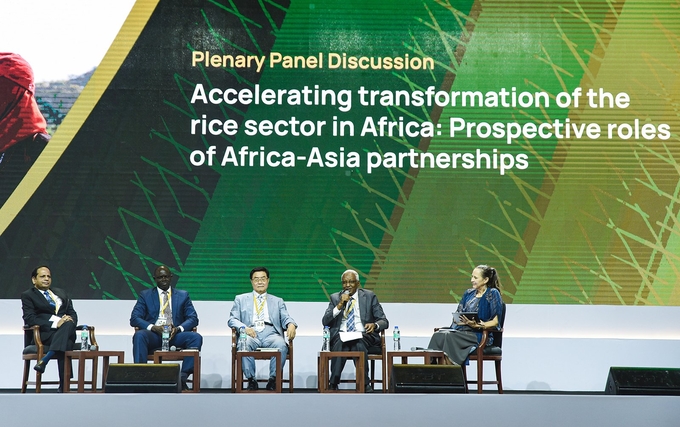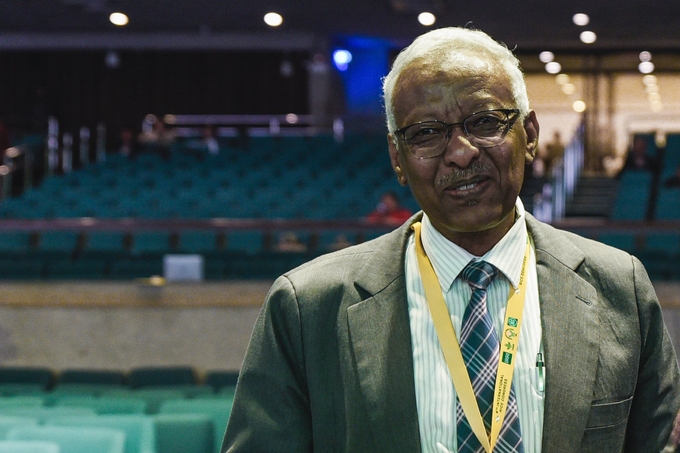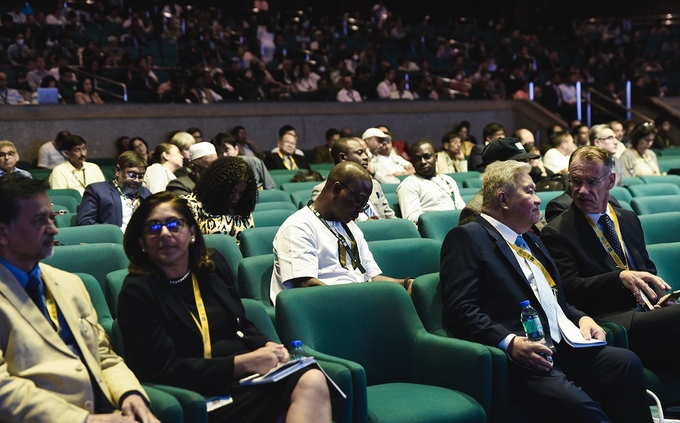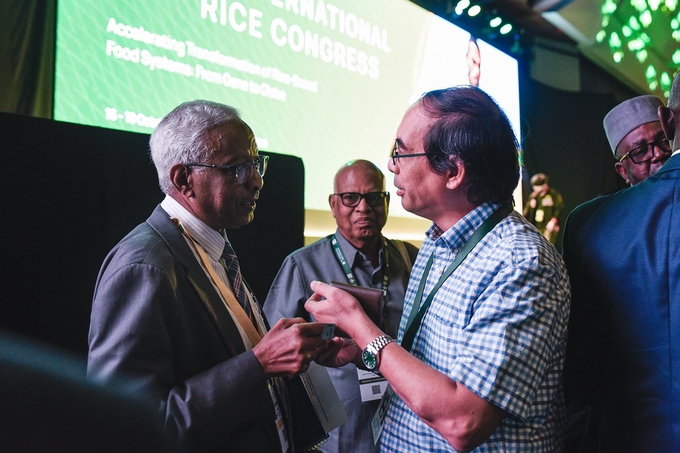June 15, 2025 | 12:59 GMT +7
June 15, 2025 | 12:59 GMT +7
Hotline: 0913.378.918
June 15, 2025 | 12:59 GMT +7
Hotline: 0913.378.918

Panel discussion with the theme “Accelerating transformation of the rice sector in Africa: Prospective roles of Africa-Asia partnerships.” Photo: Quynh Chi.
Of the 1,500 experts attending the 6th International Rice Congress (IRC 2023), the majority are delegates from Asia and Africa. Compared to previous iterations of the Congress, the number of African delegates attending IRC 2023 has increased significantly.
One of the prominent topics discussed at IRC 2023 is how Asia can support and transform rice production in Africa. Currently, 60% of the world’s agricultural land area is located on this continent, but it has not been developed effectively.
With climate change becoming increasingly severe, many countries have stopped exporting rice. Therefore, the existing arable land in Africa is an important resource to ensure food security for the whole world.
In 2022, the President of the Republic of Sierra Leone visited the Mekong Delta and expressed interest in learning about Vietnam’s model to support small-scale farmers. Countries like Mozambique, Togo, Senegal, and Uganda also want to exchange science and technology.
For the African rice sector, Vietnam’s transformation from a rice-importing country to being self-sufficient and the world’s main rice exporter is exemplary. African scientists consider it crucial to learn about how Vietnam has done it, what transformation means, and learn the necessary lessons to improve what Vietnam lacks.
African experts say that policy development contributes to determining the remarkable growth of Vietnam’s rice industry. They observe that once the Vietnamese Government is determined to innovate, the management apparatus will support farmers at the highest level, from planting, farming to production and marketing. This effort has improved the entire value chain, creating an esteemed Vietnamese rice brand worldwide.

IRRI-Africa Regional Director: South - South cooperation is an active learning process. Photo: Quynh Chi.
IRC 2023 is an event that connects countries that need assistance with countries that have the capacity. On this occasion, the Vietnam Agriculture Newspaper interviews with Dr. Abdelbagi Ismail, Regional Director of the International Rice Research Institute - Africa Office (IRRI-Africa).
“I started working at IRRI 23 years ago and know Vietnam very well through cooperation in rice science. In my experience, there is nothing that works like exposure. And that’s why we are trying to promote this South - South cooperation as a learning process,” Dr. Ismail says.
He emphasizes the importance of knowledge exchange and policy advice: “When two Ministers discuss policy, they will grasp all ideas and deploy them in the country. Two scientists will take a long time.” Therefore, he hopes that high-level dialogues will happen more often.
In addition, the Regional Director of IRRI-Africa hopes that Vietnam will support in training, thereby developing experienced doctors, masters, agricultural extension workers, and technicians.
He says that if Vietnam offers any exchange program, IRRI-Africa can support selecting students and send them to Vietnam for training. If it is for degree training, IRRI-Africa is willing to co-supervise with Vietnamese institutions. This will be an opportunity for Africa to build the capacity of the entire industry.

IRC 2023 welcomes more African delegates than previous iterations. Photo: Quynh Chi.
In addition, Dr. Ismail recognizes an opportunity for Vietnam to expand business activities in Africa as a win-win situation, importing machinery, equipment, and technologies. Once the market mechanism is established, African countries can access the Vietnamese market by exporting raw materials and agricultural products.
At IRC 2023, the role of Vietnam’s rice sector is affirmed. Currently, the total amount of rice exported by India and Vietnam accounts for about 55% of the total rice supply and demand in the world market. In addition, Vietnam’s research achievements in the rice field have been exposed as many Vietnamese delegates are invited to present at the Congress.
As a pillar of the world’s rice production, Vietnam is willing to exchange experience, human resources, and research ideas to develop the African rice industry.
Dr. Dao The Anh, Vice President of the Vietnamese Academy of Agricultural Sciences (VAAS), notes: “The potential for agricultural cooperation between Africa and Asia, especially between Africa and Vietnam in agricultural extension, scientific research, irrigation investment, sustainable farming are all feasible. Every year, through the Academy’s programs, many experts from our country travel to Africa to participate in research and support training.”

Dr. Dao The Anh exchanges information with the Regional Director of IRRI-Africa. Photo: Quynh Chi.
Africa and Asia share many economic, historical, and social values. One important thing is that both regions appreciate the rural and nature. For both peoples, agriculture means a life force.
From the conversations with experts from Vietnam and IRRI Africa, we recognize that the world is now a village. Such rural characteristics in diplomatic relationships serve not only economic and social benefits but are also the basis for countries to support each other.
To live together and overcome current challenges, countries need to develop agriculture equally in order to ensure global food supply. Therefore, South-South cooperation needs to be concretized through positive activities based on bilateral benefits.
This December in Hau Giang, a Vietnam-Africa conference on policy exchange will take place within the framework of Vietnam’s International Rice Festival. This is a large-scale event with 400 delegates, which creates opportunities for South - South cooperation to transform the food system.

(VAN) The working delegation from the Ministry of Agriculture and Environment conducted an important trip to the Netherlands to strengthen strategic partnerships and sustainable development in the agricultural sector.

(VAN) The letter ‘A Plea from the Ocean’ not only evokes emotion but also awakens the human conscience to the responsibility of protecting life on Earth.

(VAN) The Department of Agriculture in South Africa has announced the country’s first mass vaccination of poultry to prevent local birds from contracting avian influenza.

(VAN) Establishment of the Mekong Delta Regional Agricultural Linkage Center, aiming for a closed value chain, deep processing, trading platforms, and international market connectivity.

(VAN) Gia Lai province has recently recorded 460 rare species of animals and plants, contributing to forest conservation and biodiversity planning in the region.

(VAN) Ms. Caroline Beresford, New Zealand Ambassador to Vietnam, expressed confidence that agricultural cooperation between Vietnam and New Zealand will develop sustainably, be climate-resilient, and promote gender equality.

(VAN) Vietnam reaffirms its commitment to international cooperation in fostering sustainable and responsible fisheries while ensuring resilient livelihoods for small-scale fishing communities.